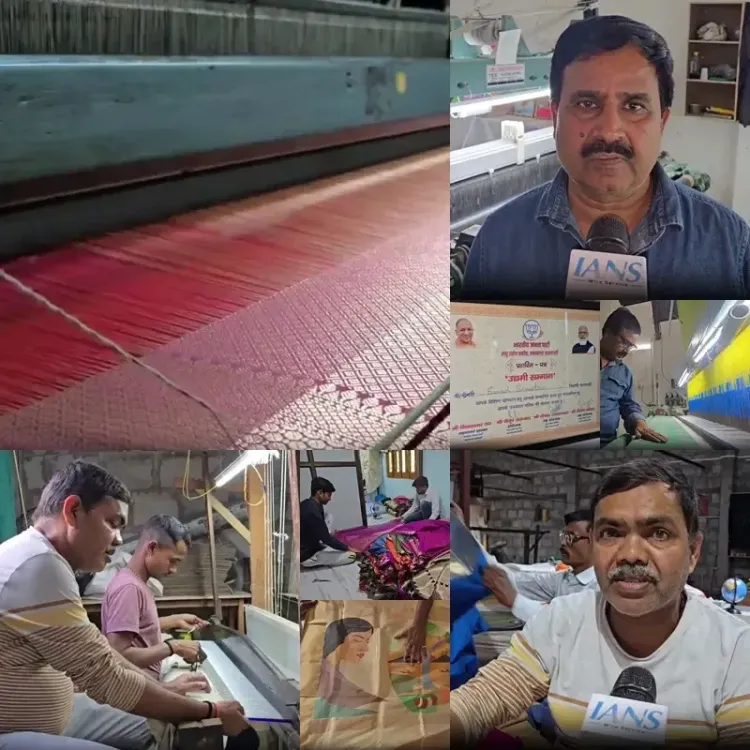Weavers of Varanasi Flourishing Thanks to PM Modi's Initiatives, Beneficiaries Call it 'Sanjeevani Booti'

Synopsis
Key Takeaways
- Government schemes like PM Mudra Yojana and ODOP are revitalizing weavers.
- Direct selling has increased profits by eliminating middlemen.
- Local artisans are expanding operations with improved access to credit.
- Indian silk is now competitive in quality and price.
- A significant increase in demand for Banarasi sarees is noted.
Varanasi, April 15 (NationPress) The eternal looms of Varanasi are creating more than mere Banarasi sarees these days - they're weaving tales of revival, self-sufficiency, and economic upliftment. Thanks to a range of initiatives introduced by the government led by Narendra Modi, especially post-2014, Varanasi's weavers and textile entrepreneurs are witnessing a revival that many refer to as a 'Sanjeevani Booti' — a vital force that has rejuvenated a fading craft.
Once struggling with high prices of imported Chinese silk, exploitation by middlemen, and inadequate institutional backing, Varanasi’s weaving community is now enjoying flourishing times. With programs like the PM Mudra Yojana, One District One Product (ODOP), Silk Hub, and Weaver Credit Cards, access to credit has improved remarkably, and the supply chain has become more localized, with Indian silk now accessible at reasonable prices.
IANS spoke to several weavers from Varanasi.
Local artisan Azruddin, who has been in the industry for 22 years, remarked: "Previously, we had to purchase costly Chinese silk, which became pricier due to GST and taxes. Nowadays, Indian silk is not only available but also of superior quality. The government has guaranteed that we obtain silk at subsidized rates through the Silk Card, which is a significant relief."
He mentioned that nearly 50–60 weavers in his vicinity have expanded their operations using PM loan schemes.
"We used to operate two machines. Now, many of us are managing 10 to 12 machines," he added.
"Chinese silk was once finer, but now Indian silk is competing fiercely. Our sarees made from Indian silk are equally fine and more economical," he continued.
A major transformation has been the elimination of middlemen, who previously took a large share of the weavers' earnings. Now, direct sales have allowed local artisans to enjoy better profit margins.
Trader Mohammed Aneesh, who specializes in Banarasi sarees, shared his experience.
"There was a time we struggled. Now, demand has skyrocketed. Earlier, I had just two machines. Today, many like me have expanded. Machines are manufactured locally, and business is thriving. The most significant change? No more middlemen. We sell directly and earn more," he noted.
For weaver entrepreneur Sarvesh Srivastava of Kashyam Textiles, the Pradhan Mantri Rozgar Yojana proved to be a game-changer.
"We secured a loan of Rs 50 lakh and set up a handloom unit. Previously, securing a loan was arduous. Now, banks are supportive, and the process is seamless," he added.
Srivastava mentioned that he was recently recognized with the 'Resham Ratna Award' by Uttar Pradesh Chief Minister Yogi Adityanath.
"Implementation was the critical missing element in prior administrations. Schemes existed, but weavers struggled to access them. Now, that’s transformed," he said.
Another beneficiary, Rameshwar Lal Srivastava, who has been in the textile industry for 15 years, discussed the positive impact of the ODOP scheme.
"I applied for a loan years ago, but it got stuck in bureaucracy. When the ODOP scheme was introduced, I received Rs 5 lakh without collateral. I installed Jacquard Looms and upgraded my facility. It felt like the loan came to me instead of me pursuing it," he stated.
For Rameshwar, the schemes were genuinely a lifeline.
"It’s indeed a 'Sanjeevani Booti.' Employment in this sector was dwindling. Now, it's rejuvenating and flourishing," he concluded.










